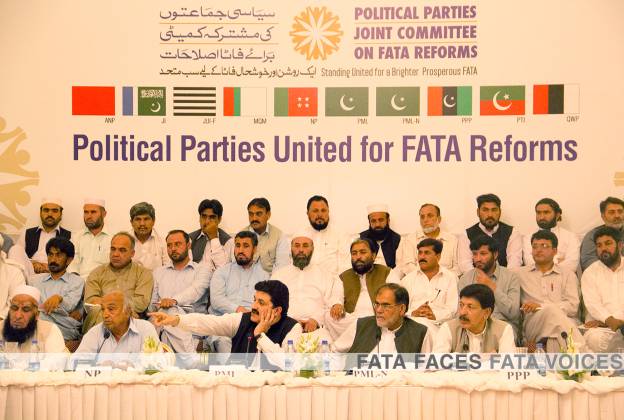After the grand scale carnage that occurred on December 16, 2014 at the Army Public School in Peshawar, both our military and civilian government has decided to eradicate the roots of militancy and extremism from the country.
In this regard, the 20 point National Action Plan was created with progress being made over many of the points laid down.
The twelfth point of NAP was on the reforms in FATA and in this regard on November 8, 2015 Prime Minister Nawaz Sharif formed a five-member committee for finalizing reforms in the tribal area.
The committee was to be headed by Sartaj Aziz, his adviser on foreign affairs. The other members of the committee are Minister for SAFRON Lt. General (retd) Abdul Qadir Baloch as secretary, KP Governor Sardar Mehtab Khan Abbasi, National Security Adviser Lt. General (retired) Naseer Khan Janjua and the government’s top legal expert, MNA Zahid Hamid.
The formation of a high-powered panel by the government for proposing reforms in FATA, however, appears to be another misguided attempt to bring much needed relief to the dilapidated region.
The first question that should be asked before the initiation of reforms is: who benefits from them?
Will it benefit the common citizens or a particular class of the area?
What does it do for the second largest class, that is the women of the region?
Will everyone benefit from these reforms?
Before finalizing the reforms one should first answer these questions honestly.
If seen in this context, the formation of the panel, consisting of people not even remotely attached to the ground realities of FATA, is akin to laying a crooked foundation for a high-rise building.
Even a cursory glance at the composition of the committee would reveal a most fatal flaw. Its members may be high-profile people with rich experiences and exposure, yet not a single member hails from FATA itself.
None of them have the requisite knowledge of the peculiarities of the area i.e. the people, culture and norms. The committee can counter this by consulting extensively with the local people on a regular basis to get their feedback. However, the profile of the people in the committee, with their busy schedules, will be a major obstacle in conducting regular meetings with the locals.
It will also hinder members from travelling to FATA on a regular basis to meet with the local population. A committee imposed from the top will never be able to come up with recommendations that are reflective of the true aspirations of people of the tribal areas.
However, when the committee did visit all the seven agencies and met with elders of the area, tribesmen, political party leaders and civil society members protested collectively rejecting Frontier Crimes Regulations (FCR) and asked the Reforms Committee to merge FATA with Khyber Pakhtunkhuwa.
Similarly on April 24, 2016 the people of South Waziristan Agency staged protests in Wana and Dera Ismail Khan against the scheduled visit of the Prime Minister’s FATA Reforms Committee. A protester while talking to the media said that 95% people of FATA were against the FCR and only five percent people, who are privileged and benefitting administration, are in favour of this law.
The committee is only meeting with those five percent people and a selected class of the area while tribal locals from all the seven agencies protest against the reforms committee.
Similarly the reforms package was introduced in FATA in 2011, but it did not include any privileges for the tribal women. Naheed Afridi, a women’s rights activist in Khyber Agency, said that women had been completely side-lined in the FATA reforms process, which is very disappointing. However, she also said that, many tribal women have not given up efforts to be heard in the reforms process.
Another woman, Samina, said that men don’t know what to do to ensure education, training and healthcare of tribal women. She said that all the decisions about the educational institution, health centers and other facilities are taken by the tribal lawmakers, Maliks and political administration officials, who are all men. They have no idea about the rights and requirements of women.
A few days ago the FATA reforms committee met with Prime Minister Nawaz Sharif and gave a briefing on the final bill draft for mainstreaming the tribal areas. According to sources, the Reforms Committee FCR will be replaced by the local ‘Rawaj’ law and the whole process of merging FATA will take 5 to 10 years.
My point is that whatever the recommendation of the committee be it merging FATA with KP, making it a separate province or introducing a tribal council, coming to a conclusion by not taking on board all the various classes of the tribal areas is nothing more than a waste of time.
Reforms without the participation and will of the local people are meaningless and unsustainable. Reforms committee should properly look into the questions I have posed and make the final draft based on prudent answers to those questions.






